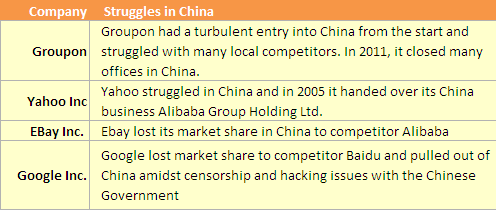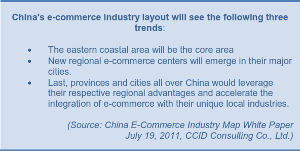A Boston Consulting Group report stated that by 2015, the yearly value of China’s e-commerce market would grow by four times to $305 billion to become the world’s largest. Many e-commerce enterprises that are famous globally have emerged in China. Here are a few factors responsible for the successful growth of e-commerce in China:
Internet Usage
The Chinese spend about 1 billion hours online each day and are younger (73% of China’s total online population is aged less than 35) than their western counterparts. This is more than double the daily total in the US. Cheaper internet and increasing disposable income contributes to higher spending power. China has an average connection speed of one mbps compared to its neighbor India’s 0.8 mbps.
| 2006 | 3% |
| 2009 | 8% |
| 2012 | 19% |
American E-Commerce does not work in China
“Foreign e-commerce companies should be acutely aware of the differences in China’s cultural, political, social, and economic development, and adapt to those differences.”
– Justin Ren, associate professor at the School of Management.
While American e-commerce firms have been successful in non-Chinese foreign markets, they have not fared that well in China. In 2004, Amazon bought a Chinese website to enter the China market but flopped. eBay spent around $400 million in China but could not capture even 10% of the market. Google had its own problems with the Chinese government over censorship and hacking scandals. Foreign firms hire Chinese mangers but the centralized management renders it ineffective. Moreover, website designs which work back home do not work in China. For example, Chinese websites are less about selling while eBay’s Chinese website emphasized low priced products and was similar to the design in the U.S. Therefore, even famous brands like Louis Vuitton, Levi Strauss, and Ray-Ban have teamed with the Chinese websites like Taobao to sell their goods.
China’s Internet entrepreneurs
The Chinese online entrepreneurs’ drive to win & sheer hard work is unmatched. Many work part-time and study as well.
Filling voids than disrupting existing industries
Unlike the west, Chinese online businesses fill voids in market rather than disrupt existing industries. Moreover, offline businesses are less efficient.


